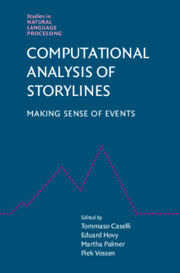Book contents
- Frontmatter
- Contents
- List of Contributors
- Introduction and Overview
- Part One Foundational Components of Storylines
- Part Two Connecting the Dots: Resources, Tools, and Representations
- 7 The Richer Event Description Corpus for Event–Event Relations
- 8 Low-Resource Event Extraction via Share-and-Transfer and Remaining Challenges
- 9 Reading Certainty across Sources
- 10 Narrative Homogeneity and Heterogeneity in Document Categories
- 11 Exploring Machine Learning Techniques for Linking Event Templates
- 12 Semantic Storytelling: From Experiments and Prototypes to a Technical Solution
- Author Index
8 - Low-Resource Event Extraction via Share-and-Transfer and Remaining Challenges
from Part Two - Connecting the Dots: Resources, Tools, and Representations
Published online by Cambridge University Press: 06 November 2021
- Frontmatter
- Contents
- List of Contributors
- Introduction and Overview
- Part One Foundational Components of Storylines
- Part Two Connecting the Dots: Resources, Tools, and Representations
- 7 The Richer Event Description Corpus for Event–Event Relations
- 8 Low-Resource Event Extraction via Share-and-Transfer and Remaining Challenges
- 9 Reading Certainty across Sources
- 10 Narrative Homogeneity and Heterogeneity in Document Categories
- 11 Exploring Machine Learning Techniques for Linking Event Templates
- 12 Semantic Storytelling: From Experiments and Prototypes to a Technical Solution
- Author Index
Summary
Event extraction aims to find who did what to whom, when, and where from unstructured data. Over the past decade, event extraction has made advances in three waves. The first wave relied on supervised machine learning models trained from a large amount of manually annotated data and crafted features. The second wave introduced deep neural networks with distributional semantic embedding features but still required large annotated data sets. This chapter provides an overview of a third wave with a share-and-transfer framework, which enhances the portability of event extraction by transferring knowledge from a high-resource setting to another low-resource setting, reducing the need for annotated data. The first share step is to construct a common structured semantic representation space into which these complex structures can be encoded. Then, in the transfer step, we train event extractors over these representations in high-resource settings and apply the learned extractors to target data in the low-resource setting. We conclude with a summary of the current status of this new framework and point to remaining challenges and future research directions to address them.
- Type
- Chapter
- Information
- Computational Analysis of StorylinesMaking Sense of Events, pp. 163 - 186Publisher: Cambridge University PressPrint publication year: 2021



